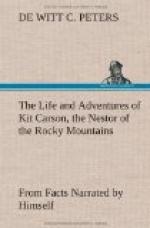The mountain on which the Apaches were concealed, as described in this adventure with them, is devoid of trees, and hence, is what, in western language is known as a “bald mountain.” Its summit contained a dry basin; which, besides the open lookout that the eminence commanded, formed another inducement to these Indians in selecting it for a hiding-place. The route from New Mexico to the United States, which we have before spoken of as the Bent’s Fort road, runs through, or rather, close to, the Raton Mountains. On account of its being well timbered, and offering somewhat of a protection, this route is often chosen late in the autumn and early in the spring, as the safest for caravans to travel. As a hunting district it cannot be surpassed, especially in the seasons of the year above mentioned, as the game collects there for shelter from cold and storms.
At night, a squad of men under command of Lieutenant R. Johnston, of the First Regiment of United States Dragoons, secreted themselves in the camp lately occupied by the Indians, in the expectancy that some of them would return to reconnoitre and see what had been done there. Along with this detachment, there was a man belonging to the spy company who could counterfeit the call used by these Indians when they wish to find each other and collect their forces. At about midnight, when all was still, this peculiar-toned whistle was sounded, when lo and behold! two warriors and two squaws came forth and commenced groping about in the darkness. They were fired upon, but as no accurate aim could be taken, only one of the men was mortally wounded. There is no reason to doubt that there were more of these Indians concealed in the neighborhood, but the report of the rifles and the yells of their exposed brothers, caused them to cling to their hiding-places; and, as the shades of night advanced, they thought it was best to be on the move to distant parts. Hence, they escaped. The Apaches, in this affray, parted with forty head of horses and also their scanty allowance of camp equipage; for, by prosecuting the war, they were fast becoming poverty stricken; but, to do them as much harm as possible, all the articles that could be of any service to them were collected and destroyed.
A spectator, not used to seeing Indians in all phases, on beholding these Apaches in their most nourishing condition, would at once decide they had but little else to lose than their bodies, for they usually have but a small quantity of clothing on them; but this is but an instance where human eyes can be easily deluded. As long as he has his rifle with plenty of ammunition, or even when he is reduced to his bow and arrows, the Apache still considers that he is amply provided to carry on war. Least of all the Indians in the far West does this race prepare for the future. When deprived of his horse, which he is ready, at a moment’s warning, to convert into food by killing, his spirits are as buoyant as if he was mounted on the fleetest charger. He is equally careless about partaking of his last morsel of nourishment, although his rashness may drive him, and often does, to the alternative of subsisting on roots and bark, or such other articles as may fall in his way.




